Andre Tinio is many things: Albertan, social worker, child of Filipino immigrants but, more recently, he’s also felt the grips of tuberculosis (TB) and now advocates for a world where no one else has to experience this disease. And he’s doing so right here on Parliament Hill, joining advocates from across Canada and the world for a passionate TB Hill Day on September 25th.
As dozens of advocates, from survivors to health practitioners to policy experts, flocked to Ottawa to talk to decision-makers and urge Canada to #LeadOnTB, it’s voices and experiences like Andre’s that propel us to push for progress against the deadliest infectious disease killer.

[RC] Hi Andre, thanks for sitting with us. Can you tell us a bit about your TB story? Whatever you’re comfortable sharing 😊
I was diagnosed with TB in late July of 2024. My symptoms were atypical as I did not present pulmonary symptoms at the time when I was admitted to the hospital. I presented with appendicitis symptoms and after assessment and 10 days in the hospital, I was diagnosed with TB in my stomach, colon, L2 + L3 vertebrae, and in my lungs. To say the least, I was severely sick.
I noticed I was starting to feel unwell in May and was slowly losing weight and had more feelings of fatigue and general malaise. I did not suspect TB due to the lack of pulmonary symptoms, therefore, it was a shock to me when I was formally diagnosed and how severe it was. My recovery journey of formal medication treatment would be a full year. Based on the severity of my case, I did not see improvement until November. I was in severe pain from August to October in my stomach and back which impacted my mobility.
It was life changing as I had to comply with medication treatment in the form of video call compliancy, monthly check ins with my healthcare team, appointments for diagnostic imagery, and balancing work/personal life commitments.
I officially stopped taking medication in August, but I will still need to self-monitor my body for a year and still complete follow up appointments with my GP, TB specialist, and diagnostic imagery. I have chronic pain in my back and lower body and am focusing my energy and intentions now to preserving my back and creating good strategies and habits to sustain and improve my overall health and wellness.
[RC] How did you get through it and what kept you going throughout your illness?
Therapy and being candid and transparent with my friends, family, and work about the journey. Sometimes, when we give advice to those who are sick, we frame it through a toxic positivity lens or “it could be worse” lens. I think validating and holding space for those who are sick in general is more useful. Offering a listening and non-judgmental ear or providing specific offers/tasks for those who are sick is also helpful. It is also important to be consistent with your help and offers. However, I do need to acknowledge that whenever you are in a position in helping a person who is sick or who has TB, remember your own wellness and boundaries. Caregiver and compassion burnout is real.



[RC] What are you most passionate about undertaking in your TB advocacy?
I am passionate about education and educating people about public health and why good social programming and caregiver/friend supports is needed. When I was sick, I could understand why some caregivers can struggle as the medical appointments and medication compliancy can overwhelm all involved. There should be collaboration between governments and community agencies to offer more robust and individualized treatment plans for patients diagnosed with TB. For example, therapy is costly in Alberta. The mental health struggles that I had were immense and I needed consistent check ins. That’s why therapy should be a basic healthcare option for all and have it be affordable.
Additionally, maintaining work and securing work when I was impacted by TB is a strong factor in how I survived as my workplaces were flexible and accommodating to my situation. I know many places are not like that, therefore, strong work protections and accommodations for anyone who is sick must be championed.
[RC] What do you think Canada can do to make progress in ending TB?
In addition to what I mentioned above, Canada can also be a leader in investing in TB medication improvement and manufacturing. When I was finishing my treatment the last few months, my healthcare team had to ration one of my medications as there was a shortage from the manufacturer in the states. In this day in age, there should be no shortage of medication for any disease. Canada can invest in this area and be leaders as the medication that I was using is archaic. The medication and the side effects that it caused me were brutal. Canada can invest and find new medications to trial and test so the medicines of the past can be phased out and new efficient treatment options can be provided which can help aid in the individual who is sick integrate quickly, efficiently, and safely back into society.
[RC] To wrap this up, do you have any parting words for our readers, especially for our volunteer advocates who are fighting to generate the political will in Canada to address TB?
We all have a role to play in TB advocacy and in public health advocacy. Find what is meaningful to you and specialize in it. If it’s grassroots advocacy, working directly with politicians, providing treatment as a nurse, the options are limitless. We all have a responsibility in ensuring we can create a society where TB is eliminated and that our healthcare system can respond reactively and proactively. Pick one action, no matter how small you may think it is, and do it. That small action will have rippling effects even if you do not see it.
Andre was born and raised in rural Alberta and moved to the province's big cities to pursue higher education: a BA in Sociology from the University of Alberta and a BSW from the University of Calgary. He is now a registered social worker working at the Alberta College of Social Workers, and consultant with the City of Edmonton.
